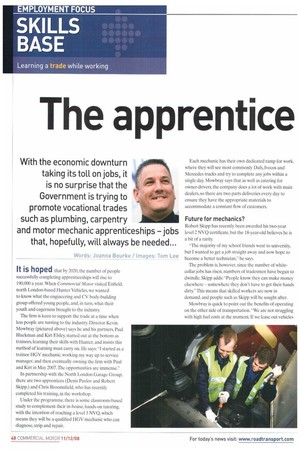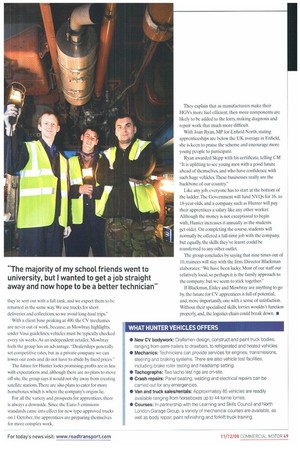The apprentice
Page 48

Page 49

If you've noticed an error in this article please click here to report it so we can fix it.
With the economic downturn taking its toll on jobs, it is no surprise that the Government is trying to promote vocational trades such as plumbing, carpentry and motor mechanic apprenticeships jobs that, hopefully, will, always be needed...
Words: Joanna Bourke / images: Tom Lee It is hoped that by 2020, the number of people successfully completing apprenticeships will rise to 190.000 a year. When Commercial Motor visited Enfield, north London-based Hunter Vehicles, we wanted to know what the engineering and CV body-building group offered young people, and, in turn, what their youth and eagerness brought to the industry.
The firm is keen to support the trade at a time when less people are turning to the industry. Director Kevin Mowbray (pictured above) says he and his partners, Paul Blackman and Kirt Elsley, started out at the bottom as trainees, learning their skills with Hunter, and insists this method of learning must carry on. He says: "I started as a trainee HGV mechanic, working my way up to service manager, and then eventually owning the firm with Paul and Kirt in May 2007. The opportunities are immense.
In partnership with the North London Garage Group, there are two apprentices (Denis Pavlov and Robert Skipp,) and Chris Broomsfield, who has recently completed his training, in the workshop.
Under the programme. there is some classroom-based study to complement their in-house, hands-on tutoring, with the intention of reaching a level 3 NVQ, which means they will be a qualified HGV mechanic who can diagnose, strip and repair. Each mechanic has their own dedicated ramp for work, where they will see most commonly Dafs. Ivecos and Mercedes trucks and try to complete any jobs within a single day Mowbray says that as well as catering for owner-drivers, the company does a lot of work with main dealers, so there are two parts deliveries every day to ensure they have the appropriate materials to accommodate a constant flow of customers.
Future for mechanics?
Robert Skipp has recently been awarded his two-year level 2 NVQ certificate, but the 18-year-old believes he is a bit of a rarity.
-The majority of my school friends went to university, but I wanted to get a job straight away and now hope to become a better technician," he says.
The problem is, however, since the number of whitecollar jobs has risen, numbers of tradesmen have begun to dwindle. Skipp adds: "People know they can make money elsewhere — somewhere they don't have to get their hands dirty." This means that skilled workers are now in demand, and people such as Skipp will be sought after.
Mowbray is quick to point out the benefits of operating on the other side of transportation. "We are not struggling with high fuel costs at the moment. If we lease out vehicles they're sent out with a full tank, and we expect them to be returned in the same way. We use trucks for short deliveries and collections, so we avoid long-haul trips."
With a client base peaking at 400, the CV mechanics are never out of work, because, as Mowbray highlights, under Vosa guidelines, vehicles must be typically checked every six weeks. As an independent retailer, Mowbray feels the group has an advantage. "Dealerships generally set competitive rates, but as a private company we can lower our costs and do not have to abide by fixed prices.
The future for Hunter looks promising; profits are in line with expectations and, although there are no plans to move off-site, the group says it would not shy away from creating satellite stations. There are also plans to cater for more horseboxes, which is where the company's origins lie.
For all the variety and prospects for apprentices, there is always a downside. Since the Euro-5 emissions standards came into effect for new type-approved trucks on 1 October, the apprentices are preparing themselves for more complex work. They explain that as manufacturers make their HGVs more fuel efficient, then more components are likely to be added to the lorry, making diagnosis and repair work that much more difficult.
With Joan Ryan, MP for Enfield North, stating apprenticeships are below the UK average in Enfield, she is keen to praise the scheme and encourage more young people to participate.
Ryan awarded Skipp with his certificate, telling CM: "It is uplifting to see young men with a good future ahead of themselves, and who have confidence with such huge vehicles. These businesses really are the backbone of our country."
Like any job, everyone has to start at the bottom of the ladder. The Government will fund NVQs for 16to 18-year-olds, and a company such as Hunter will pay their apprentices a salary like any other worker. Although the money is not exceptional to begin with, Hunter increases it annually as the students get older. On completing the course, students will normally be offered a full-time job with the company, but equally, the skills they've learnt could be transferred to any other outlet.
The group concludes by saying that nine times out of 10, trainees will stay with the firm. Director Blackman elaborates: "We have been lucky. Most of our staff our relatively local, so perhaps it is the family approach to the company; but we seem to stick together."
If Blackman, Elsley and Mowbray are anything to go by, the future for CV apprentices is full of potential, and, more importantly, one with a sense of satisfaction. Without their specialised skills, lorries wouldn't function properly, and, the logistics chain could break down. •




























































































































































